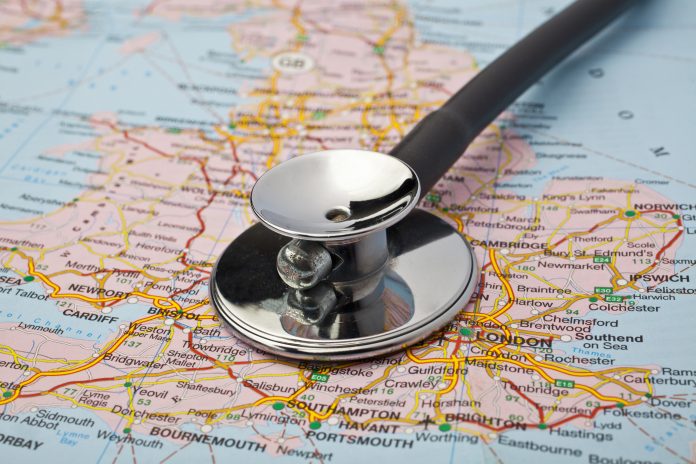With only 2 months to go, Nicholas Kelly, CEO, Axela Ltd, discusses what needs to be done now in order to prepare healthcare services for the post-Brexit era
Just two short months until the UK leaves the EU. Despite the fact that the pandemic has pushed Brexit negotiations from the front pages in recent months, they are still ongoing, and time to secure a deal is fast running out. Combined with the effects of COVID-19, they will have a dramatic influence on our healthcare service for years to come.
The EU provides our legal framework
There’s been a lot of scrutiny around how the UK’s departure from the EU will affect our National Health Service (NHS), and for good reason – the NHS is deeply linked to the population’s overall wealth as well as factors like food standards legislation, air cleanliness and other directives that comes from the EU.
The overall health of the population, and, as a result, our health service, is directly aligned with policies that have been in place for many years, for example, the Working Time Directive which limits the working hours in a week to 48, and the General Food Law regulation which keeps our food production and processes safe. The EU has been our legal framework since the UK joined the then EEC in 1973, and going it alone will demand a review of a huge number of matters.
The NHS and staffing
Key concerns for the NHS are funding and staffing; both complex issues even without the added pressure of an imminent departure from the EU, and now, COVID-19 has prompted healthcare professionals to pull together like never before, with scores coming out of retirement to help battle the pandemic. The BMA reported that an extra 28,000 of recently retired doctors have this year stepped back in to help deal with the emergency.
But this is temporary and feels like using a plaster to help a broken arm. The NHS is still facing an underlying staffing crisis and combined with the fact that there are over 200,000 EU nationals currently employed in the wider healthcare system today, leaving the EU could have a huge impact on the number of nurses, carers and doctors we need for the NHS to operate properly. In a survey released by the NHS confederation, 131 health leaders across NHS trusts, clinical commissioning groups and care systems urged the government to address critical issues and to transform services for patients in the face of this staffing crisis. 90% of the leaders surveyed believed that under-staffing was putting patients at critical risk.
The term PPE has also been thrust into the spotlight in 2020, and as much as it might have galvanised discussions this year, lack of PPE is not a new problem. Over 70% of our PPE is currently produced abroad, with around 60% of it coming from China. The crisis has highlighted our reliance on these markets and the need to put measures in place to secure a stable supply in future.
Changes in data laws
September’s roll-out of the second Track and Trace app in the UK, following the abandonment of the first after an unsuccessful trial in the Isle of Wight, has led to over 19m downloads. Having been hailed “the fastest download of an app in British history”, it still falls short of the three-quarters of the UK population that was needed to make it successful, according to scientists.
Despite not achieving hyper penetration, questions were still quickly being asked about data concerns. Namely, what information will be collected about each individual and how will it be used? Matt Hancock tried to allay fears by promising, “all data will be handled according to the highest ethical and security standards”. Yet, some worry this won’t help with a widespread erosion of public trust in data collection.
The EU exit will have other knock-on effects around how companies and public bodies handle data that have been less widely publicised. Since GDPR (General Data Protection Regulation) came into force in May 2018, how data is processed and collected has come under close scrutiny to give back power to individuals instead of companies.
The UK Government has publicly stated that GDPR will be incorporated into UK domestic law and will continue to be enforced alongside the Data Protection Act of 2018. However, if there is no deal reached between the UK and EU, the situation becomes more unclear as the UK would be outside of the approved list of countries for data transfer, and would have to apply to be granted ‘adequacy’ status which is required for data to flow from the UK to the EU and back freely.
Electronic Health Records (EHRs) provide an instant and accessible view of a patient’s health and care and can cut down on the need for hospitalisation due to the ability to predict illness based on a large number of data points and a clearer picture of the patient’s overall health. They are especially effective when managing complex and chronic conditions which are more common in those over 65. Complicated data legislation from the fall-out of a no-deal Brexit could compromise thousands of patients’ access to this easy, single view of their health data.
There is an argument for patients owning their own data in the future. The current system means that a patient’s records sit with their GP, and they contain information on consultations, diagnoses and treatments. But what’s to say this kind of information can’t sit alongside the new wave of technologically retrieved data?
Whether it’s live-streamed from wearable devices, or genome data, or video and sensor data gathered to log against a fitness plan, they all contribute to providing a more holistic view of a patient at any one time. At the moment, patient information is owned and distributed by the NHS, which has wide implications for research in particular. What if, in the future, patients opted out of sharing their data for research?
However, the arguments for are stronger than those against; we don’t allow any other government body to own personal information on us such as our banking or digital footprint, why should our health history be any different? If you own your data, then it can’t be used, as is the concern now with the impact of Brexit, as a bargaining chip or lever to pull in trade agreements.
As with managing the Track and Trace app, it comes down to building trust with patients so they can see the benefit in sharing their information to inform wider population health policies and helping the NHS to become more effective. How the healthcare system innovates in this space and shows it can evolve and take on challenges in the next decade will be crucial in persuading patients to be willing participants in sharing their data for the greater good.
Putting patients back in the driving seat
The argument for having EHRs that are patient-owned and accessed is only going to gain more traction. Given that data laws will be changing, and those who process sensitive and personal data will be under renewed scrutiny, having a patient-centric method of storing vital information seems a sensible option. It would be a huge step backwards if EHRs were no longer a viable option after Brexit for many individuals, and a waste of all the progress that has gone into making patient data use more effective.
Investing in digital is one of the top priorities for senior leaders in the health sector according to the NHS confederation survey results, and the crisis has shown us its potential in action. 93% of leaders think that the capital spending laid out for the NHS is just the start of what is needed, and IT infrastructure was the most popular area of spending for nearly half of the respondents. Looking at the NHS crisis in general, the level of investment isn’t the only solution; we need to continue to look at innovative ways to solve problems.
Technology to improve the patient experience
For example, to reduce waiting times in A&E, less critical cases could be judged over the phone using a real medic who can see your face and discuss what is wrong almost instantly. Once triaged, you would be given the time that you’ll be seen, and then the choice to either remain in A&E or to go home. Depending on the progress of your appointment you will be kept up to date, be given information on possible treatment and asked some general questions tailored to you and your symptoms. All this information will be sent to the doctor to review, and if, for some reason, the waiting time is adjusted due to a major emergency, the patient is kept updated.
Transformation is now needed, involving extra capital investment and a rethink of IT infrastructure plus staffing to create a future-proof and resilient service. Putting patients and their care at the very heart of our health service is a necessary change, and one that can done through smart technologies, partnering with innovative independent businesses and joined-up thinking. It is this kind of innovation in process that the NHS needs to adopt now more than ever. When it comes down to improving care and patient support, strong contingency planning for all aspects of continued care needs to be built in, so however the chips fall in politics, our health service will be in a strong position to move into the next decade with renewed purpose.











